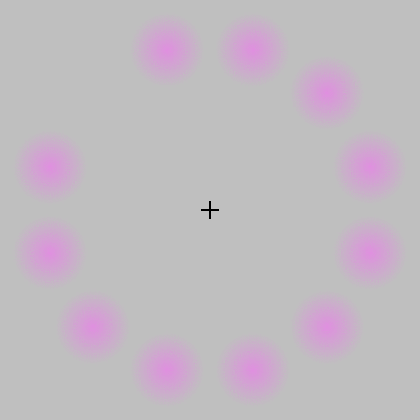Instructions: Look at the gif below for a period of ten seconds focusing only on the plus sign in the center of image.
If you stared at the image long enough you should have noticed that three things happened:
The Troxler Effect is named after Swiss physician and philosopher Ignaz Paul Troxler (1780-1866). In 1804, Troxler made the discovery that rigidly fixating one’s gaze on some element in a visual field can cause surrounding stationary images to slowly fade or disappear. This is known as filling-in, although it would seem to me to be doing the exact opposite.
How does it work?
Scientists aren’t exactly sure. But according to Wikipedia, "research indicates the effect is related to how neurons important for perceiving stimuli are adapted by the visual system. Unchanging stimuli will eventually disappear from our awareness while our mind will fill the areas where they used to be with the background information (or color)."
- A gap running around the circle
- The gap turned green
- The lilac circles disappeared leaving just the green circle rotating around the plus sign
The Troxler Effect is named after Swiss physician and philosopher Ignaz Paul Troxler (1780-1866). In 1804, Troxler made the discovery that rigidly fixating one’s gaze on some element in a visual field can cause surrounding stationary images to slowly fade or disappear. This is known as filling-in, although it would seem to me to be doing the exact opposite.
How does it work?
Scientists aren’t exactly sure. But according to Wikipedia, "research indicates the effect is related to how neurons important for perceiving stimuli are adapted by the visual system. Unchanging stimuli will eventually disappear from our awareness while our mind will fill the areas where they used to be with the background information (or color)."
In the Troxler Effect, the magenta circles don’t actually disappear. If at the same time, someone else was standing next to you and looking at the same image but not focusing on the plus, they would clearly see the circles. Our singular focus (on the small plus sign) fools our mind into no longer seeing what is, in fact, right in front of us.
In short, by focusing on something small, we lose sight of the bigger picture.
I myself, have fallen victim to the Troxler Effect.
Many times in my career I stared at the little things for so long that I lost sight of the bigger picture. Many times I focused on the performance and not the process. Many times I obsessed over the product and not the process. Many times I was so singularly focused on the product that I lost sight of the persons performing it. I guess you could say that at times, I was so focused on the dots, drill, and scores that my students disappeared right before my very eyes.
With looming and immoveable deadlines (either in band or your academic classes, or LIFE, it’s easy, if not convenient, to fall victim to the Troxler Effect. It’s easy to forget that today’s rehearsal is one of many, that Friday night’s performance is merely one out of dozens, and that next week’s score is just a small part of our journey together.
It’s easy to lose sight of the fact that band is not a singular performance but is a collective experience meant to develop YOU (the students), the young people in our programs, as YOU are the most important thing...and that the time that we spend together, either in a rehearsal, a field trip, or just hanging out in the band - is all part of the journey together.
Just as in the Troxler Effect, when we focus on the little things, we lose sight of the bigger picture. Don’t worry though, it is still there. When Troxler gets the best of you, just stop focusing solely on the little things so you can see the bigger picture of what we do and and why we do it.
GO BEARS!
I myself, have fallen victim to the Troxler Effect.
Many times in my career I stared at the little things for so long that I lost sight of the bigger picture. Many times I focused on the performance and not the process. Many times I obsessed over the product and not the process. Many times I was so singularly focused on the product that I lost sight of the persons performing it. I guess you could say that at times, I was so focused on the dots, drill, and scores that my students disappeared right before my very eyes.
With looming and immoveable deadlines (either in band or your academic classes, or LIFE, it’s easy, if not convenient, to fall victim to the Troxler Effect. It’s easy to forget that today’s rehearsal is one of many, that Friday night’s performance is merely one out of dozens, and that next week’s score is just a small part of our journey together.
It’s easy to lose sight of the fact that band is not a singular performance but is a collective experience meant to develop YOU (the students), the young people in our programs, as YOU are the most important thing...and that the time that we spend together, either in a rehearsal, a field trip, or just hanging out in the band - is all part of the journey together.
Just as in the Troxler Effect, when we focus on the little things, we lose sight of the bigger picture. Don’t worry though, it is still there. When Troxler gets the best of you, just stop focusing solely on the little things so you can see the bigger picture of what we do and and why we do it.
GO BEARS!


 RSS Feed
RSS Feed